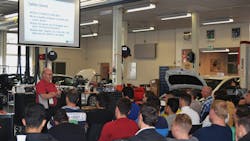Do you know your local automotive technical high school teachers’ first and last names? What about the local community college’s automotive technology professor? If not, assuming they exist close to where you live and work, visit them.
Your new hires need to know more than tires and alignments. They need a solid background in automotive theory. But theory is about the least likely subject a young technician wants to study when they have just purchased their first car. They may be more excited to hit the open road than going to school. However, there are exceptions, as my company, Automotive Career Development Center, has found at our local technical high school.
My father, Raymond, let me work at his used car lot when I was a kid. Although he didn’t have a customer-facing repair shop, he did work on the cars he bought at the local auction. In many cases, they needed their seats redone, a rebuild of the engine or a fix of the transmission. I was holding the flashlight while my interest was heightened.
In 1969, the year I graduated from high school, going off to college to earn a degree in automotive technology was unheard of. Today, it makes more sense than ever as electric cars, hybrid cars and plug-in hybrid cars are gaining popularity. More consumers are realizing the benefits of these cars and trucks. If you have a degree — or a great formal education — you are typically better off when servicing these vehicles.
Helping your local school also is a way of giving back. As you get to know the teachers and students, create — or participate in — an internship program, with their guidance. Understanding new technology is so much easier for a technician when they have critical thinking skills and a good basic understanding of electricity, electronics, hydraulics and more. You can help them do this.
I work with a company based in the Netherlands that offers virtual learning. (There are others, too.) COVID-19 taught us all we can do more on the Internet than we thought possible.
You may ask, “Is a high school diploma enough to succeed as a technician these days?” Many of us older technicians have a high school diploma. Do we have a college degree? Not many. Do you need one to be successful? Let’s define success. That is worthy of a few sentences. Webster defines success as “Favorable accomplishment or prosperity.” The successful technicians I know won’t say they are successful. Most are modest about their achievements. Some feel prosperity hasn’t been reached yet.
In today’s very high-tech auto repair world, an ASE Master with L1 is something to be proud of. An accredited automotive manager (AMM) is worth a bundle as a service writer or manager. But what about a college degree? Do technicians need one? Will it help them fix a car or run a repair shop?
I give young people advice at my training classes, as I am training more young people than ever before. What do I tell them? A college degree is a must. Do it before you have a family, a home mortgage or get past 30. My older brother, Scott, went to Clark University in Worcester, Mass. He did well and went on to attend Stanford. I didn’t follow that road.
Did it matter? Yes. A college education would have helped me run my business more effectively. A college education would have added to my technical knowledge. I am proud to say that I was successful without a degree. I was at risk early on, as it was harder for me to operate my shop without the proper education. I did attend college when I was in my 30s, but did not graduate.
In today’s marketplace, a degree will help the average tech succeed. The brightest technicians won’t have much of a problem in college, so don’t dismiss college in their automotive career development. If you employ a younger person, talk about higher education. Offer them an incentive. Support your local schools. Parents would love to see their children looking at college as part of the repair industry. It will add credibility, status and a positive self-image.
As for us old cronies, cars and trucks were pretty simple decades ago. We may be playing some old eight-track tapes, but it’s time for the old-timers to sing a different tune. The world is moving faster and we need to properly train our service personnel and hire staff.
Be part of the highly educated repair industry. When your technicians learn more, you earn more. Support scholarship funds. Talk to your staff about furthering their education. It can only make everyone’s lives more successful.
About the Author

Craig Van Batenburg
Craig Van Batenburg is MTD's monthly EV Intelligence columnist and the owner of Van Batenburg's Garage Inc. dba Automotive Career Development Center, which provides training for facilities that service - or want to service - electric and hybrid vehicles. For more information, see www.fixhybrid.com or email Craig at [email protected].
